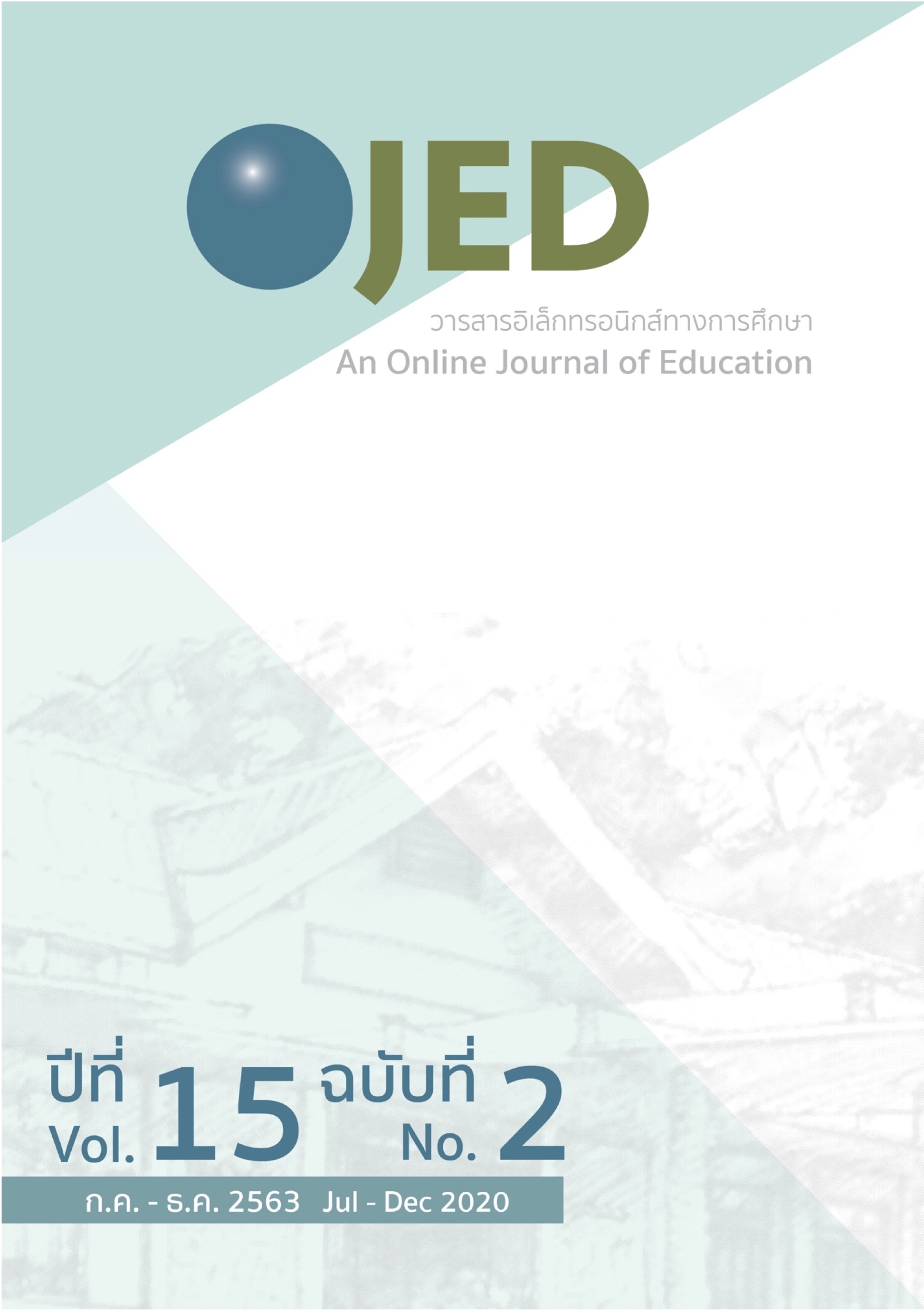แนวทางการจัดการเรียนการสอนเพื่อส่งเสริมความเป็นผู้ประกอบการของนักเรียน : คราวด์ซอร์สซิ่ง
DOI:
https://doi.org/10.14456/ojed.2020.30คำสำคัญ:
ความเป็นผู้ประกอบการ, คุณลักษณะความเป็นผู้ประกอบการ, การจัดการศึกษาเพื่อพัฒนาความเป็นผู้ประกอบการ, คราวด์ซอร์สซิ่งบทคัดย่อ
การวิจัยครั้งนี้มีวัตถุประสงค์เพื่อวิเคราะห์และสังเคราะห์ข้อมูลเกี่ยวกับการจัดการเรียนการสอนเพื่อส่งเสริมความเป็นผู้ประกอบการของนักเรียน และนำเสนอแนวทางการจัดการเรียนการสอนที่ส่งเสริมความเป็นผู้ประกอบการของนักเรียน จากการเก็บรวบรวมข้อมูลด้วยการสัมภาษณ์ผู้สอนที่มีประสบการณ์ในการจัดการเรียนการสอนเพื่อส่งเสริมความเป็นผู้ประกอบการ จำนวน 13 คน และทำคราวด์ซอร์สซิ่ง (crowdsourcing) กับกลุ่มคนสาธารณะบนสื่อสังคม (social media) ผู้วิจัยวิเคราะห์ข้อมูลดังกล่าวด้วยการวิเคราะห์เนื้อหา (content analysis)
ผลการศึกษาพบว่า แนวทางในการจัดการเรียนการสอนเพื่อส่งเสริมความเป็นผู้ประกอบการ มีดังนี้ 1) การจัดเนื้อหาในรายวิชาให้มีการสอนพื้นฐานความรู้เกี่ยวกับการทำธุรกิจ ควรเตรียมเนื้อหาพื้นฐานเกี่ยวกับการจัดตั้งและดำเนินกิจการให้ผู้เรียนได้เรียนรู้ 2) การจัดประสบการณ์การทำธุรกิจจริงให้ผู้เรียน ควรให้ผู้เรียนได้ลงมือปฏิบัติ
เขียนแผนธุรกิจ ทำโครงการ หรือธุรกิจขนาดเล็กด้วยตนเอง 3) การจัดกิจกรรมให้ผู้เรียนได้แสดงออกถึงความสนใจของตนเอง ร่วมกับการให้ผู้เรียนวิเคราะห์และวางแผนในการพัฒนาตนเองและการทำงาน 4) การสร้างทัศนคติที่ดีต่อการเป็นผู้ประกอบการ และ 5) การใช้กรณีศึกษา/สถานการณ์จำลองประกอบการจัดการเรียนการสอน
เอกสารอ้างอิง
กระทรวงศึกษาธิการ. (2561). รายการวิจัย การจัดการศึกษาเพื่อพัฒนาความเป็นผู้ประกอบการ (Entrepreneurship Education). พริกหวานกราฟฟิค.
Bellance, J., & Brandt, R. (2011). 21st Century skill: Rethinking how students learn. Solution Tree Press.
Blawatt, K. R. (1998). Entrepreneruship process and management. Upper Patrick Ferrier.
Brabham, D. C. (2013). Crowdsourcing. The MIT Press.
De Lourdes Cárcamo-Solís, M., del Pilar Arroyo-López, M., del Carmen Alvarez-Castañón, L., & García-López, E. (2017). Developing entrepreneurship in primary schools: The Mexican experience of my first enterprise: entrepreneurship by playing. Teaching and Teacher Education, 64, 291-304. https://doi.org/10.1016/j.tate.2017.02.013
Farashahi, M., & Tajeddin, M. (2018). Effectiveness of teaching methods in business education: A comparison study on the learning outcomes of lectures, case studies and simulations. The International Journal of Management Education, 16, 131-142. https://doi.org/10.1016/j.ijme.2018.01.003
Hargrave, M. (2019, July 8). Crowdsourcing. Investopedia. https://www.investopedia.com/terms/c/crowdsourcing.asp
Howe, J. (2006, June). The rise of crowdsourcing. Wired Magazine, 14(6). https://www.wired.com/2006/06/crowds/
Lackeus, M. (2015). Entrepreneurship in education what, why, when, how. OECD.
Lee, K. (2018). What do we think how best to teach university students to become entrepreneurial: The lecturers’ perspective. Proceedings of the 6th International Conference on Innovation and Entrepreneurship, USA, 206-213.
Lumpkin, G. T., & Dess, G. G. (1996). Clarifying the entrepreneurial orientation construct and linking it to performance. Academy of Management Review, 21(1), 135-172.
Michael, S. C. (2018). What should we teach in the new ventures class? An empirical analysis. Journal of Entrepreneurship Education, 21(2), 1-17.
Miller, D. (1983). The correlates of entrepreneurship in three types of firms. Management Science, 29(7), 770-791.
Miller, D., & Friesen, P. H. (1982). Innovation in conservative and entrepreneurial firms: Two models of strategic momentum. Strategic Management Journal, 3(1), 1-25.
Mintzberg, H. (1973). Strategy-making in three modes. Califonia Management Review, 16(2), 44-53. https://doi.org/10.2307%2F41164491
Morris, M. H. (2017). Why content and lecture matter in entrepreneurship education. In D. F. Kuratko & S. Hoskinson (Eds.). The great debates in entrepreneurship (pp. 1-8). Emerald Publishing Limited. https://doi.org/10.1108/S1048-473620170000027002
Nabi, N., Walmsley, A., Liñán, F., Akhta, I., & Neame, C. (2018) Does entrepreneurship education in the first year of higher education develop entrepreneurial intentions? The role of learning and inspiration. Studies in Higher Education, 43(3), 452-467. https://doi.org/10.1080/03075079.2016.1177716
Olokundun, M., Moses, C. L., Iyiola, O., Ibidunni, S., Ogbari, M., Peter, F., & Borishade, T. (2018). The effect of non-traditional teaching methods in entrepreneurship education on students’ entrepreneurial interest and business startup: A data article. Data in Brief, 19, 16-20. https://doi.org/10.1016/j.dib.2018.04.142
Swanson, L. A. (2017). Entrepreneurship and Innovation Toolkit. Pressbook.
https://openpress.usask.ca/entrepreneurshipandinnovationtoolkit/
Willians, J. L., & Gentry, R. J. (2017). Keeping it real: The benefits of experiential teaching methods in meeting the objectives of entrepreneurship education. In D. F. Kuratko & S. Hoskinson (Eds.). The great debates in entrepreneurship (pp. 1-8). Emerald Publishing Limited. https://doi.org/10.1108/S1048-473620170000027003
Wilson, K. E., Vyakarnam, S., Volkmann, C., Mariotti, S., & Rabuzzi, D. (2009, April). Educating the next wave of entrepreneurs: Unlocking entrepreneurial capabilities to meet the global challenges of the 21st century. In World Economic Forum: A Report of the Global Education Initiative.
World Economic Forum. (2011). Unlocking entrepreneurial capabilities to meet the global challenges of the 21st century: Final report on the entrepreneurship education workstream. In World Economic Forum Global Education Initiative. World Economic Forum.
Yuen, M. C., King, I., & Leung, K. S. (2011, October). A survey of crowdsourcing systems. In 2011 IEEE Third International Conference on Privacy, Security, Risk and Trust and 2011 IEEE Third International Conference on Social Computing (pp. 766-773). IEEE.
Zulfiqar, S., Sarwar, B., Aziz, S., Chandia, K. E., & Khan, M. K. (2019). An analysis of influence of business simulation game on business school students’ attitude and intention toward entrepreneurial activities. Journal of Educational Computing Research, 57(1), 106-130. https://doi.org/10.1177/
ดาวน์โหลด
เผยแพร่แล้ว
รูปแบบการอ้างอิง
ฉบับ
ประเภทบทความ
สัญญาอนุญาต
ลิขสิทธิ์ (c) 2020 วารสารอิเล็กทรอนิกส์ทางการศึกษา

อนุญาตภายใต้เงื่อนไข Creative Commons Attribution-NonCommercial-NoDerivatives 4.0 International License.




